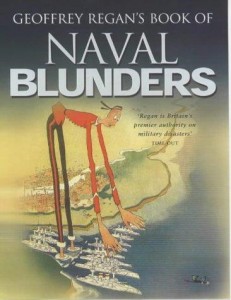Naval Blunders August 20, 2011
Author: Beach Combing | in : Ancient, Contemporary, Medieval, Modern , trackbackBeachcombing has been having a bit of a naval season and it was in celebration of this that he picked up Naval Blunders by Geoffrey Regan. Now, of course, books on blunders in history are commonplace. But this is arguably the best of all those with which Beach is familiar, in part because of the author’s writing abilities and in part because of the nature of naval warfare.
After all, even in the most savage land-lubber fighting it is rare that more than twenty percent of combatants are killed: massacres take place when combatants refuse to take prisoners or when they kill prisoners. However, in a naval battle it is much easier for things to go horribly, horribly wrong. A torpedo hitting a ship might not kill many sailors, but if the boat sinks and there is no one to pick said sailors out of the water then casualties can climb to 100%.
Likewise there are those instances from Trafalgar to Jutland where boats have simply exploded killing every single soul or almost every single soul on board. Beach always thinks of the HMS Hood that had the misfortune to go into combat against the Bismarck. When the Hood perished in a blinding flash of light three from a crew of 1418 survived: two were on the compass platform.
Then, of course, there is the fact that individuals have more influence over the sailing of a ship than they ever can over the advance of a platoon, say. Generals cannot direct those under them perfectly, they do not command automatons. They must depend on their men understanding and then deciding to follow orders: many military blunders from the tactical to the strategic have been avoided because men on the ground knew better than their commanding officers. However, if a captain on a ship says to starboard when he means port then ‘bang’.
Some of the material here is so good that it writes itself: but GR is no mean stylist and there are passages where even the reader hardened to human folly will laugh aloud or shake their heads. The finest blunders include: GR’s tour de force description of the Russian Baltic Navy passing around the world to serve itself up on a plate to the Japanese Imperial Fleet; Britain’s experiment (probably about four hundred years before their time) with hybrid ship-submarines that had a nasty knack of sinking and not coming up again; and the ‘floating whorehouse’ from the Civil War.
There is a strong British bias in the book, either because (as with this blog) authors have inevitable cultural baggage or because the British had the biggest navy for the best part of the last three centuries; or perhaps the British have a gift for writing about incompetence in war because… No, but that would be heresy.
Beachcombing is always on the look out for bizarre books: drbeachcombing AT yahoo DOT com
PS Beach’s crazy writing season continues. He’s just got to finish present draft then will put up comments and answer emails.



